Unit 8 I will help clean up the city parks.(一)
九年级英语Unit8 I’ll help clean up the city parks.讲解及练习
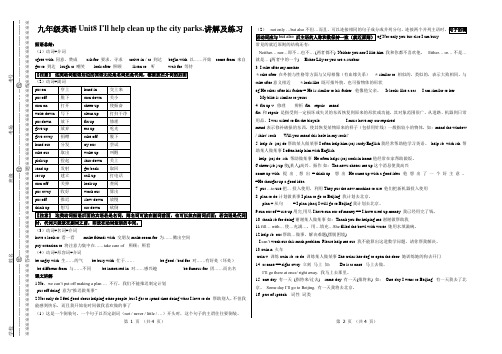
第 1 页 (共4 页) 第 2 页 (共4 页)学校 姓名 班级 考场 考号---------------------------------○密------------------ -------------------○封----------------------------- -- --○线----------------------------※※※※※※※※※※※※※※※答※※※※※※※※※※※※※※※※※※题※※※※※※※※※※※※※※※※线※※※※※※※※※※※※※九年级英语Unit8 I ’ll help clean up the city parks.讲解及练习短语总结: (1)动词+介词agree with 同意,赞成 ask for 要求,寻求 arrive in / at 到达 begin with 以……开始 come from 来自 get to 到达 laugh at 嘲笑 look after 照顾 listen to 听 wait for 等待(2)动词+副词(3)动词+名词+介词have a look at 看一看 make friends with 交朋友make room for 为……腾出空间 pay attention to 将注意力集中在……take care of 照顾;照看 (4)动词+形容词+介词be angry with 生……的气 be busy with 忙于…… be good / bad for 对……有好处(坏处) be different from 与……不同 be interested in 对……感兴趣 be famous for 因……而出名 课文讲解1.No ,we can‟t put off making a plan … 不行,我们不能推迟制定计划 put off doing 意为“推迟做某事”2.Not only do I feel good about helping other people ,but I get to spend time doing what I love to do .帮助别人,不但我能感到快乐,而且我开始花时间做我喜欢做的事了(1)这是一个倒装句。
unit8 I’ll help clean up the city parks.
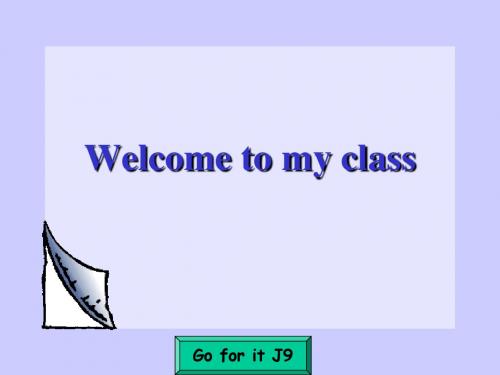
Unit 8
I’ll help clean up the city parks.
There are many other ways you could help people. You could help clean up the city parks.
You could cheer up the old people.
Brainstorm a plan for helping out in your community. Make notes on where you will help and what you will do. Then tell the class about your plan.
where ___________________________________________________________ ___________________________________________________________ what ___________________________________________________________ ___________________________________________________________
Welcome to my class
Go for it J9
A guessing game
help
Do you often help others?
Tell us something about the last time you helped others.
I helped to clean the classroom. I helped my parents with the chores. I _________________________. I _________________________.
九年级英语教案 Unit 8 I’ll help clean up the city parks. Period 3
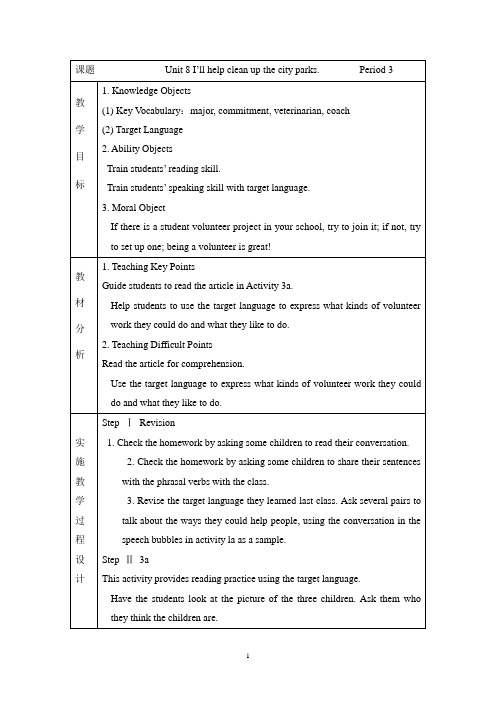
Check the answers with the class.
Then have the students read the article loudly twice. Encourage them to ask questions if they still can’t understand any words or sentences.
writing stories
give a talk on how to write stories
Joy
movies
help give out posters for a cinema
Wei
music
play music to cheer up the sad people
StepⅣ3c
This activity provides listening and speaking practise using the target language.
课题Unit 8 I’ll help clean up the city parks.Period 3教学目 Nhomakorabea标
1. Knowledge Objects
(1) Key Vocabulary:major, commitment, veterinarian, coach
(2) Target Language
Read the instructions to the students.
This is an article about volunteers. You have two tasks to do: first underline the kinds of work the volunteers do; second circle the reasons why they like their work.
I’ll help clean up the city parks教案(精选2篇)
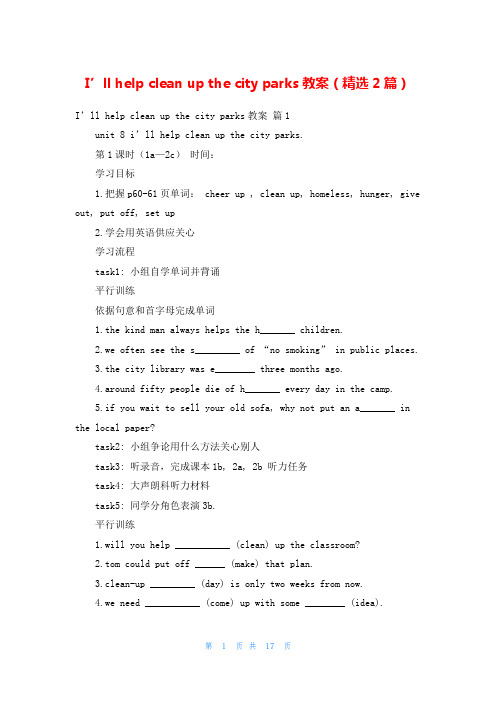
I’ll help clean up the city parks教案(精选2篇)I’ll help clean up the city parks教案篇1unit 8 i’ll help clean up the city parks.第1课时(1a—2c)时间:学习目标1.把握p60-61页单词: cheer up , clean up, homeless, hunger, give out, put off, set up2.学会用英语供应关心学习流程task1: 小组自学单词并背诵平行训练依据句意和首字母完成单词1.the kind man always helps the h_______ children.2.we often see the s_________ of “no smoking” in public places.3.the city library was e________ three months ago.4.around fifty people die of h_______ every day in the camp.5.if you wait to sell your old sofa, why not put an a_______ in the local paper?task2: 小组争论用什么方法关心别人task3: 听录音,完成课本1b, 2a, 2b 听力任务task4: 大声朗科听力材料task5: 同学分角色表演3b.平行训练1.will you help ___________ (clean) up the classroom?2.tom could put off ______ (make) that plan.3.clean-up _________ (day) is only two weeks from now.4.we need ___________ (come) up with some ________ (idea).5.they plan ___________ (buy) a big house.6._________(sing)aloud so that everyone can hear clearly.达标测评一.单项选择1.the class room is so dirty, i decided ____________.a.clean it upb. to clean it upc. clean up it2. you should visit the sick kids to __________.a. cheer up themb. laugh at themc. cheer them upd. take after them3. we have to _______ our sports meeting till next week because of the heavy rain.a. put upb. put offc. put upd. put down4. we have to put off ______ plans for the vacation.a. makeb. to makec. makingd. made5. the teacher is giving ______ the new books to the student.a. tob. outc. ind. offunit 8 i’ll help clean up the city parks.第2课时编写: 郝玉平时间:学习目标1.把握p62-63 单词: major , coach, take after, similar, fix up, repair, think up2.争论作为一名志愿者应当做什么流程学习task1: 小组自学单词平行训练1.the students plan _____ (buy) some flowers for miss wang.2.the old man is an expert. he can r________ kinds of machines.3.my clothes seem s_______ to bob’s because we lik e the same4.the radio should be f________.task2: 1.快速阅读3a把握大意2. 朗读短文,小组争论遇到的问题3.仔细阅读短文,把志愿者做的工作及喜爱做的缘由用不同的标记标出来task3: 合作探究分析下列句子1.not only do i feel good about helping other people , but i get to spend time doing what i love to do.task4: 依据3b内容,仿照3c作对话,分角色表演平行训练用所给词的适当形式填空1.let’s cheer _______ (they)up, ok?2.i’d like _____ (visit)my english teacher tomorrow.3.i’ll feel good about _______ (help)the old people.4.he _____(spend) every morning _______ (do)some sports.task5: 同学完成p63 1a,把握短语: fix up , take after, run out of, give away并用这些短语做句子task6: 1. 听录音,完成2a, 2b 的听了任务2. 大声朗读听力材料task7: 利用2a,2b的信息表演2c达标测评单项选择1.they finally thought ______ a plan and solved the problem.a. upb. overc. awayd. off2. how dirty your room is ! you must _______.a. clean it upb. clean them upc. clean it upd. do some3. when do you plan to set ______ an interest group.a. offb. outc. upd. to4. i tried my best, but i couldn’t ________.a. cheer up themb. cheer his upc. cheer he upd. cheer up he5. at the beginning of a new term, new test textbooks are ______ to students.a. give outb. give offc. given outd. given off6. not only_______ polluted but ______ crowded.a. was the city, were the streetsb. the city was, were the streetsc. was the city , the streets wered. the city was, the streets were7. he handed ______ the pens to everyone in the class.a. tob. upc. outd. withhomework:unit 8 i’ll help clean up the city parks.第3课时编写: 郝玉平时间:学习目标1.把握p64-65单:put up , ask for, hand out, work out, website2.把握消失的短语及短语的结构和特点3.喜爱公益事业,培育乐于助人的优良品质流程学习task1: 小组自学单词平行训练1.要,邀请____________2. 分发___________3. 起作用___________task2:1.快速阅读3a熟知大意2.阅读3a回答问题⑴ what problem did jimmy have ?⑵ how did he solve the problem?3.大声朗读3a,找出下列动词短语使振作__________ 用完___________ 张贴__________ 要求某物__________分发_____________ 建立_____________ 想出____________ 修理_________分发给____________ 产生结果_____________task3: 完成s elf check , 小组核对答案task4: 依据2供应的内容,叙述sally 发生的事情,并相互修改,大声朗读平行训练1. ----- peter, i think we need to buy a new car.----- oh, no. we are _____ out of money ,you know?a.tryingb. goingc. gettingd. running2. -----these problems are too hard to_______. will you give me some advice?----- there are many ways ,but the most important is to have a careful plan.a.work outb. look outc. hand outd. look up4.my parents often _______ some clothes to charity.e up withb. hand outc. give awayd. put up5.the volunteers often _____ ads calling for less pollution.a.handing outb. handing inc. hand outd. hand in6.----do you know the man?----yes, he is the doctor_______ saved the boy’s life yesterday.a. heb. whomc. whod. then7. would you please give me _____ orange juice, bill?a. a bitb. a bit ofc. a fewd. a little of8. she will _____ continue her lessons when she has money.a. canb. couldc. be able tod. able to达标测评1. when she was walking in the street, she met a friend of_______.a. sheb. herc. hersd.her’s2.he put up a map on the wall and then______.a. put it onb. put it offc. take it offd. took off3.everyone, including my parents,_______ going to be at party.a.wasb. arec. wered. will4.the plan _____ they came up with was very good.a.thenb. itc. /d. what5.----what was jimmy going to do?a.up; to ask forb. on; to ask toc. up; asking tod. down; asking for6.----it’s time for sports._______ your s port shoes, please.---- ok, i’m coming.a.put onb. put upc. take awayd. take off7.i can’t see the words clearly. can i ____ the light?a.turn onb. put offc. hold ond. take off8.-----hi, betty?shall we go swimming this sunday?-----this sunday? i am sorry. i have a lot of homework _____ this sunday.a.to dob. doingc. dod. to be done走进中考1.they had to _____ the 800 meter race because of the bad weather.a. put onb. put offc. get ond. get up2. ---- look, mary looks sad. l et’s go and ____.---- all right.a. cheer up himb. cheer him upc. cheer up herd. cheer her uphomework:unit 8 i’ll help clean up the city parks.第4课时(reading) 时间:学习目标:把握p66单词2. 句型:i’d like to thank you for…………i’ll send you a photo of ……….you see you have helped make it possible for me to have a lucky.3. 语法:动词短语的运用4. 学会如何向别人表示感谢学习流程task1: 小组学习p66页单词,并把握重点单词:fill, pleasure, blind, deaf, imagine, shut, carry, specially, fetch, at once, help sb out 平行训练依据句意和首字母提示完成单词1.tom went into his room and s________ the door behind him.2.the boys often help the old man c________ water and sweep the floor.3.the dog f_______ the stick that we had tossed(仍)。
九年级英语下教案人教版Unit 8 I’ll help clean up the city parks.
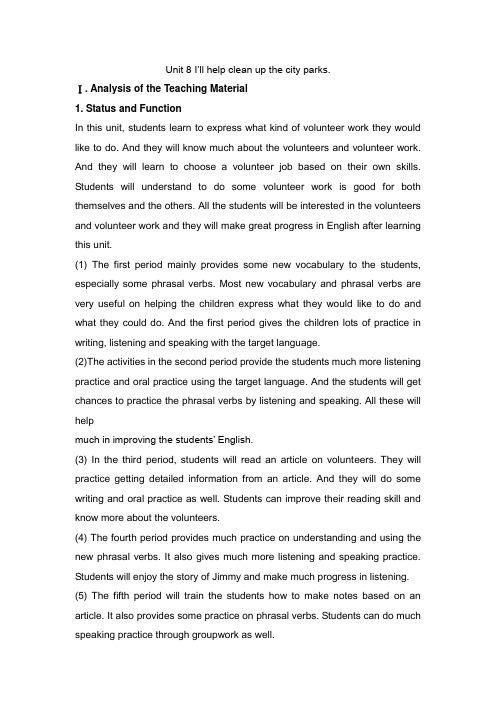
Unit 8 I’ll help clean up the city parks.Ⅰ. Analysis of the Teaching Material1. Status and FunctionIn this unit, students learn to express what kind of volunteer work they would like to do. And they will know much about the volunteers and volunteer work. And they will learn to choose a volunteer job based on their own skills. Students will understand to do some volunteer work is good for both themselves and the others. All the students will be interested in the volunteers and volunteer work and they will make great progress in English after learning this unit.(1) The first period mainly provides some new vocabulary to the students, especially some phrasal verbs. Most new vocabulary and phrasal verbs are very useful on helping the children express what they would like to do and what they could do. And the first period gives the children lots of practice in writing, listening and speaking with the target language.(2)The activities in the second period provide the students much more listening practice and oral practice using the target language. And the students will get chances to practice the phrasal verbs by listening and speaking. All these will helpmuch in improving the students’ English.(3) In the third period, students will read an article on volunteers. They will practice getting detailed information from an article. And they will do some writing and oral practice as well. Students can improve their reading skill and know more about the volunteers.(4) The fourth period provides much practice on understanding and using the new phrasal verbs. It also gives much more listening and speaking practice. Students will enjoy the story of Jimmy and make much progress in listening. (5) The fifth period will train the students how to make notes based on an article. It also provides some practice on phrasal verbs. Students can do much speaking practice through groupwork as well.(6)The sixth period is designed to train the students’ writing skill. It also provides some more practice on using the new phrasal verbs.2. Teaching Aims and Demands(1) Knowledge ObjectsIn this unit, students learn to express the volunteer work they would like to do and give suggestions to the others. They will also learn some new phrasal verbs.(2) Ability ObjectsTo train the students to use the phrasal verbs, and to train the students’ listening, speaking and writing skills using the target language.(3) Moral ObjectBeing a volunteer is great!3. Teaching Key PointsTo help students learn and grasp the phrasal verbs and the target language. To let students know something about the volunteer work.4. Teaching Difficult PointsTo train students’ listening, speaking, reading and writing skills with the target language.To train the students to use the phrasal verbs.5. Studying WayGet students to be interested in volunteer work and do something really on it. Ⅱ. Language FunctionOffer helpⅢ. Target Language1. I’d like to work outside.2. I’ll help clean up the city parks.3. You could give out food at a food bank.Ⅳ. StructurePhrasal verbsⅤ. Vocabularyput off, hand out, call up, give away, run out of, clean up, set up, take after, fix up, cheer up, give out hunger, sign, repair.Ⅵ. Recyclingcome up with, put up, think up hospital, park, bank, food, lunch, bike, money, outside, volunteer, advertisementⅦ. Learning StrategiesSequencingDeducingⅧ. Teaching TimeSeven periodsThe First PeriodⅠ. Teaching Aims and Demands1. Knowledge Objects(1) Key Vocabularyclean up, hunger, homeless, cheer up, give out, volunteer, food, bank(2) Target LanguageI’d like to work outside.You could give out food at a food bank.2. Ability Objects(1) Train the students to express offering to help with the target language.(2) Train the students’ listening skill.3. Moral ObjectOffer help to the others as much as possible.Ⅱ. Teaching Key Points1. Key Vocabularyclean up, hunger, homeless, cheer up, give up2. Target LanguageHow to express offering to help with target language.Ⅲ. Teaching Difficult Points1. Teach the students how to use the new phrasal verbs.2. Teach the students to express offering to help with target language.Ⅳ. Teaching Methods1. Teaching by giving sample sentences and making up sentences.2. Teaching by showing pictures.Ⅴ. Teaching Aids1. A tape recorder2. Some pictures on volunteer’s offering helpⅥ. Teaching ProceduresStep Ⅰ Revision1. Revise the language points in Unit 7.Ask some questions like this: Where would you like to go on vacation? (I’d like to/I’d love to/l hope to… )Why?(Because…)2. Revise the contents in Unit 7. Say to the class like this:What things Who can say something about Singapore?do you like there and what things don’t you like about it?Ask them to give the answers without looking at the books.3. Check homework by asking some students to read their sentences they’ve made with the verbs. Let them hand in their homework.4. Dictate ten words in Unit 7.Step Ⅱ laThis activity introduces the key vocabulary and provides some writing practice. In this unit we learn to offer to help.We’ll use some phrasal verbs. Each phrasal verbs has two or three words, such as clean up, cheer up, give out.Here is an example o n how to use clean up. Look at the title of Unit 8. I’ll help clean up the city parks. Repeat it twice, please.Ask the children to read the title twice.Then go on saying, "clean up means make a place clean and tidy, put thingsthere in order". Let’s see another example, We should always clean up after a picnic.Who can explain this sentence in your own, words?Ask one student to explain the sentence.He or she may say like this. This sentences means we should burn wastepaper, collect litter and empty bottles, etc.Then say to the class. Who can make more sentences with clean up?Ask several students to share their sentences to the class.Do the same with the other phrasal verbs.Some sample sentences1. clean up—make a place clean and tidy, put things in orderWe should always clean up the dirty parts of the sea.2. cheer up—make someone feel happyThe good news cheers everyone up.3. give out—hand out, distributeLin Tao helped the teacher give out the new textbooks to the class.Read the instructions to the students.Please look at the picture now. We can see a bulletin board and two children in it. What is the bulletin board about?Help students to answer: Volunteer Today!Then continue saying, "Who can tell me the meaning of volunteer?"Ask one student to try to explain it. Then tell them the meaning of it. Volunteer means a person who offers to do something unpleasant or dangerous. It means a person who offers to help the others sometimes. Volunteer is used as a verb in this lesson.Draw the students’ a ttention to the three posters on the board.We can see one sentence in each poster.And we can see some people in each poster, too. What are the volunteers doing in each poster? Please work in pairs and talk about the posters.Give the students a few minutes to talk about what they will say. Let them talkabout all the three items. Move around and help the pairs as needed.Then read the sentences in the posters to the class. Ask the pairs of students to explain what the sentence means in their own words. Or tell what the volunteers are doing in the posters.For example, for the first poster, a pair might say:It means there is trash in the park. There are papers on the ground. We can help clean up the park by picking up papers and trash. We can make the park clean.After the students have finished all the items, ask the students to add some other ways they can help people. Get them to write the ways down in the box below the picture.At last, ask some students to share their ideas with the class. Write any new words or phrases on the board and explain these words to the class, if necessary.Some sample answers:Visit some single elderly people and help them with housework.Help clean up the neighbourhood.Cheer up the people who look sad.Help the teacher give out the papers to the students.Save money to help the poorer children.Step Ⅲ 1bThis activity gives students practice in understanding the target language in spoken conversation.Call the students’ attention to the two lists in the box in Activity lb. Ask some students to read the eight sentences on the lists to the class. Explain any new words and phrases in it.Make sure that all the students can understand the meanings of the eight items.Then get the children to read the instructions together.Say, we will hear four conversations.Your task is to match the items in the two lists. We can see the blanks in front of the first line of each conversation. Listen to the conversations and write the letter in front of the first line of each conversation. Put the letters of the second line of conversations in right places.Point out the sample answer to the class.Play the recording the first time. Tell the students to only listen.Then play the recording a second time.Tell them to write a letter in front of each numbered sentence this time.Check the answers.Answers1. c2. a3. d4. bTapescriptConversation 1Boy 1: I’d like to work outside.Girl 1:You could help clean up the city parks.Conversation 2Boy 2:I’d like to help homeless people.Girl 1:You could give out food at the food bank.Conversation 3Girl 2:I’d like to cheer up si ck kids.Girl 1: You could visit them in the hospital.Conversation 4Girl 1:I’d like to help kids with their schoolwork.Girl 2:You could volunteer in an after-school study program.Optional activityAsk the students to choose a volunteer job they might like to do and draw a picture of it. They can draw a picture like the posters in the textbook. They can also add a sentence describing the job. They may do this in several groups. After they’ve finished, display the pictures on a bulletin board and discuss these pictures with the class.Step Ⅳ 1cThis activity provides guided oral practice using the target language.Read the instructions with the class.Call their attention to the example in the speech bubbles in Activity la. Ask a pair of students to read this conversation to a class. Then let them practice in pairs.Note their pronunciation of "like to" in phrases such as, I’d like to help hungry people. Tell them English speakers usually pronounce the words "like to" as if they were spelled like-tuh.Play the I’d like to statements on the recording to demonstrate this pronunciation.After they’ve finished practicing the sample conversation, ask them to make up similar conversations based on the other two posters. Get two pairs to demonstrate two conversations first. They may say like this:S A: I’d like to cheer up sick kids.S B: You could visit sick children in the hospital.S A: I’d like to help homeless people.S B: You could give out food at a food bank.Then let the whole class practice in pairs.After that, play the recording of activity 1b and let the children read after it twice.Then ask them to practice similar conversations using the information in Activity 1b.Step Ⅴ SummarySay, In this class, we’ve learned how to express offering help. And we’ve learned several phrasal verbs. At last, we did some oral practice using target language.Step Ⅵ Homework1. Make up one sentence with each of the following phrasal verbs:clean up, cheer up, give out2. Write out three conversations of activity 1c.Step Ⅶ Blackboard DesignThe Second PeriodⅠ. Teaching Aims and DemandsKnowledge Objects(1) Key Vocabularyclean-up, sign, put off, set up, establish, come up with(2) Target LanguageI’ll help clean up the city parks.2. Ability Objects(1) Train the students’ listening skill.(2) Train the students’ communicativ e competence using the target language.(3) Train the students to use the new phrasal verbs: cheer up, set up, come up with, put off/3. Moral ObjectPlan a City Parks Clean-up Day with your good friends and come up with some ideas to tell people about it.Ⅱ. Teaching Key Points1. Listening practice with target language.2. Make communications with target language.3. How to use the phrasal verbs.Ⅲ. Teaching Difficult Points1. Make communications with target language.2. Use the phrasal verbs.Ⅳ. Teaching Methods1. Listening2. Pairwork3. Role play the conversationⅤ. Teaching AidsA tape recorderⅥ. Teaching ProceduresStep Ⅰ Revision1. Revise the knowledge points on Page 60. Ask several students to tell some ways they could help people with books closed.2. Check homework by asking several pairs to read their conversations which they wrote down.3. Check homework by asking some students to read their sentences with the phrasal verbs. Let them hand in their homework.Step Ⅱ 2aThis activity provides listening practice using the target language.We can see five pictures in Activity 2a.What can you see in each picture?Ask five different students to describe the pictures. They may say like this: Picture 1: We can see a TV screen in Picture 1.Picture 2: There is a girt putting a sign on the board.Picture 3: A boy is making a call.Picture 4: We can see a copy of newspaper with the advertisement.Picture 5: A boy is giving out advertisements to people.After that, ask a student to read the words on the TV screen, on the sign and in the newspaper.We’ll hear some students at a club meeting. They are talking about how their club can help clean up the city parks.Ask the class to read the instructions together. Tell them to note the box of each picture, they will have to tick in the boxes of the items they hear on the recording.Now listen to the club members talking about what they can do to clean up the city parks and tick in the right small boxes.Play the recording the first time.Students only listen.Play the recording again. Ask students to check the things they hear.Check the answers.AnswersThe following pictures should be checked: b c cTapescriptBoy 1: OK. Now we need to come up with a plan to tell people about the city park clean-up.Girl 1: Yeah, but I’m hungry, Bob. let’s have lunch first.Girl 2: No, we can’t put off making a plan. Clean-up Day is only two weeks from now.Boy 2: You’re right. Sally, while we talk, I’ll write down all our ideas. Then we can decide which ideas are best.Girl 1: U m… Well … we could put up signs.Boy 2: That’s a good idea!Girl 2: I’11 hand out advertisements after school.Boy 1: OK. Great! And we could each call up ten people and ask them tocome.Boy 2: Hey, we’ve coming up with a lot of good ideas, aren’t we?Step Ⅲ 2bThis activity provides listening and writing practice using the target language. Read the instructions with the class. And let them have a look at the sentences.Read the first sentence to the students.Tell them it is a sample answer.Say, We will hear the same recording again. This time listen carefully to what the students say and fill in the blanks in the sentences.Play the tape again and the students write out the answers.Check the answers.Answers1. come up with2. put off3. write down4. put up5. hand out6. call upStep Ⅳ 2cThis activity provides guided oral practice using the target language.Ask students to look at the sample conversation first. Ask a pair to read it to the class.Ask the class to read the instructions together.Say. You’ll work in pairs to role play t he conversation in Activity 2b.Each pair will make a conversation like the sample one. You can use the sentences in Activity 2b as a guide.Ask the students to work in pairs. More around the classroom, checking the progress of the pairs and offering help as needed.Ask one or two pairs to say their conversations to the class.Step Ⅴ Grammar FocusThis activity introduces several phrasal verbs.Say, Do you remember the meaning of cheer up? Who can tell us?Ask a student to explain the phrasal verb cheer up like this:Cheer up means make someone happy.Then get students to make up some sentences with it.Say, Let’s learn some more phrasal verbs today. Please open your books at page 61. Look at the content in Grammar Focus and try to tell me the meanings of set up and come up with.Ask two children to tell their meanings like this:Set up means establish or start.Come up with means think up.Then get students to read the sample sentences in the grammar box.Write the phrasal verbs and the sentences on the blackboard.Get students to make more sentences with these phrasal verbs to get a further understanding.Step Ⅵ SummarySay, In this class, we’ve done some listening and writing practice with target language. We also did some oral practice in pairs. And we’ve discussed some phrasal verbs as well.Step Ⅶ Homework1. Write two conversations like the sample in Activity 2c.2. Make up one sentence with each of the following phrasal verbs: set up, come up with, put off, hand out, call upStep Ⅷ Blackboard DesignThe Third PeriodⅠ. Teaching Aims and Demands1. Knowledge Objects(1) Key Vocabularymajor, commitment, veterinarian, coach(2) Target LanguageI’d like to join the school volunteer project.You could help coach a football team for little kids.2. Ability ObjectsTrain students’ reading skill.Train students’ speaking skill with target languag e.Train students’ writing skill with target language.3. Moral ObjectIf there is a student volunteer project in your school, try to join it; if not, try to set up one; being a volunteer is great!Ⅱ. Teaching Key Points1. Guide students to read the article in Activity 3a.2. Help students to use the target language to express what kinds of volunteer work they could do and what they like to do.1. Teaching Difficult Points1. Read the article for comprehension.2. Use the target language to express what kinds of volunteer work they could do and what they like to do.Ⅳ. Teaching Methods1. Pairwork2. Role playⅤ. Teaching AidsSome pictures that the volunteers are working, or some signs of the volunt eers’ clubs.Ⅵ. Teaching ProceduresStep Ⅰ Revision1. Check the homework by asking some children to read their conversation.2. Check the homework by asking some children to share their sentences with the phrasal verbs with the class.3. Revise the target language they learned last class. Ask several pairs to talk about the ways they could help people, using the conversation in the speech bubbles in activity la as a sample.Step Ⅱ 3aThis activity provides reading practice using the target language.Have the students look at the picture of the three children. Ask them who they think the children are.Then call the students’ attention to the title of the article and ask the children to read it out. Ask them the question again.This time they may answer. They are three volunteers.Read the instructions to the students.This is an article about volunteers. You have two tasks to do: first underline the kinds of work the volunteers do; second circle the reasons why they like their work.Continue saying. The names of the three volunteers are Li Huiping, Lan Pei and Zhu Ming. The article tells you about the different things they do to helppeople.Please read the article the first time and underline the things they do. There are three questions on the blackboard to help you.Write the three questions on the blackboard and tell them to scan the passage to get the answers and underline the words.Questions1. What does Li Huiping do to help people as a volunteer?2. What does Lan Pei do?3. What does Zhu Ming do?Check the answers by asking three students to answer the questions.Read the article to the class and do some explanation on any new words. Tell the students to raise their hands when I come to any word or sentence they don’t understand. Pause and do some explanation.Try to explain the new words in English like this: major means more important, for example, a major operation, the major roads; A veterinarian means an animal doctor, a doctor who treats animals.After that, get the students to read the article a second time to circle the reasons.Check the answers with the class.Then have the students read the article loudly twice. Encourage them to ask questions if they still can’t understand any words or sentences.Move around the classroom and answer the students’ questions.AnswersUnderlined words: She helps young children learn to read after school. …volunteers every Saturday morning at an animal hospital… sings for groups of people at the City Hospital.Circled words: You can do the things you love to do…he has learned a lot about animals …he has met some wonderful people at the hospital.Step Ⅲ 3bThis activity provides reading and writing practice using the target language.Read the instructions to the students.And tell them I love English. I could teach English in an after-school program. Hui loves playing football. What could Hui do if he wants to join the school volunteer project?Help the students answer. He could coach a fcf6tball team for little kids.Tell them coach means teach or train.Then ask the students to look at the table in Activity 3b.We can see three columns in this form.There are four names in the first column.And we can know what each of them loves doing from the second column, the column of loves. Now our task is to fill in the blanks in the third column, the column of Could. Get the students to discuss in pairs and fill the results of their discussions in the blanks.Move around the classroom to make sure that they are discussing in English and offer them help as necessary.Ask several pairs to report their answers to the class. Answers will vary but should show a sense of volunteering as well as a relationship to the skill. They may give answers in completely sentences orally but write in phrases. Sample answersStep Ⅳ 3cThis activity provides listening and speaking practise using the targetlanguage.Ask a pair of the students to model the sample conversation first.S A: I’d like to join the school volunteer project, but I’m not sure what I should do.S B: What do you like doing?S A: I love playing football.S B: Well, you could help coach a football team for little kids.Write the conversation on the blackboard.Model for the rest of the class.Then let the whole class practice in pairs. Remind them to use the sample conversation, but replace the words loves and skills.Move around the classroom while they are working, checking the progress and offering help as necessary.Ask two or three pairs to share their conversations to the class.Step Ⅴ Part 4This activity provides written and oral practice using the target language. Read the instructions to the class.Call the students’ attention to the clart on the left. Point out the titles Things I like to do and volunteer work I could do to the students.At first, each of you writes down three things you like to do on the lines in the column of Things I like to do. You can write in either complete sentences or phrases. For example, you can fill in the blank with I love drawing pictures, or Drawing pictures.Get the students to write down their own answers individually.As students write, move around the room helping with vocabulary if necessary. Show some pictures of volunteers’ work to remind them as well. Ask several to read their things they like to do to the class.Then work in pairs and give each other suggestions about what volunteer work you could do with those interests. Ask a pair to model the sample conversationbefore they begin to practice.S A:I like to read about Chinese history.What kind of volunteer work do you think I could do?S B: You could start a Chinese History Club.Write the conversation on the blackboard.Get students to practice in pairs.As the students practice, move around the classroom, correcting some mistakes they may make and helping them answer the questions.Tell them to fill in the blanks in the column of Volunteer work I could do with the suggestions that their partners have given them.After all of them have finished writing, ask one or two pairs to share their conversations to the class.Sample answersStep Ⅵ SummaryIn this class, we’ve learned more about the volunteers and their work. And we’ve done much oral and written practice on volunteer work with target language.Step Ⅶ Homework1. Write a conversation like the sample on in Activity 3c.2. Write a conversation like the sample one in Activity 4.Step Ⅷ Blackboard DesignThe Fourth PeriodⅠ. Teaching Aims and Demands1. Knowledge Objects(1) Key Vocabularyrun out of, take after, fix up, give away, repair, not…any more, similar advertisements(2)Target LanguageWhat do you do, Jimmy?I fix up bikes and give them away.2. Ability Objects(1) Train the students’ reading,writing, speaking and listening skills with the target language.(2) Train the students to use the new phrasal verbs.3. Moral ObjectCome up with a good idea to help others. It will bring you much enjoyment. Ⅱ. Teaching Key Points1. Train the students’ reading, writing, speaking and listening skills with the target language.2. Teach the students to use the new phrasal verbs properly.Ⅲ. Teaching Difficult PointTeach the new phrasal verbs.Ⅳ. Teaching Methods1. Making up sentences2. Listening3. PairworkⅤ. Teaching AidA. tape recorder.Ⅵ. Teaching ProceduresStep I Revision1. Revise the contents of the article in Activity 3a. Section A by asking some questions like these.Questions1. What does Li Huiping love to do?And what does she do as a volunteer?2. What does Lan Pei love and what does he plan to be when he leaves school? Where does he spend every Saturday working?3. What about Zhu Ming? Say something about Zhu Ming.4. What do they say about their volunteer work?5. What do they plan to do?2. Check the homework by asking some students to read the conversations they wrote. Correct any mistakes they might have made. Let them hand in their homework.Step Ⅱ 1aThis activity introduces new target language.Read the instructions to the students.Make sure that each one knows what to do.Let the students look at the sentences in the left column first. Try to explain the four sentences in English for the children, especially the new phrasal verbs in the sentences. Say to them like this:Please look at the sentences on the left column. Let’s get the meanings of them.Let’s see the first one. I’ve run out of itHere, run out of is a phrasal verb. It means reach an end of, use up or become short of. I’ve run out of it, means I’ve used it up, nothing left.Explain the other sentences in the same way like this.2. I take after my mother.take after——be like sb. or be similar to sb.I take after my mother. ——I am like my mother.3. I fixed it up.fix up——install, fit together and place in position, repair, renewI fixed it up. ——I installed it, or I repair it.4. I gave it away.give away——make a present of, donateI gave it away.——I donated it. I gave it to someone without money.After explaining the sentences, read each sentence in the box and ask the students to repeat.Then ask several students to explain the sentences with letters in front of them.Tell them to explain them in their own sentences. For example, Sentence a, the student might respond. My bicycle was broken. I couldn’t ride it. I got new tires and a new seat. Now it works fine.Read the instructions again and ask the students to match the sentences with similar meanings.Say, Now match the numbered sentences with the lettered sentences in the box.Write the letter of one sentence in front of the number of the matching。
初二英语下册Unit8_I’ll_help_to_clean_up_the_city_parks知识点详解

Unit8 I’ll help to clean up the city parkshelp sb with sth help oneself to sth随便吃&可数名词欢呼We all cheered when EXO arrived.We heard the cheers when EXO arrived.练习:He failed in the test and looks sad, let’s_____.A put him upB set him upC cheer him upD clean him up分发= hand out 散发(光、热)用完,耗尽印制出 B giving out C selling out D putting out扑灭(后接名词、代词、动名词作宾语)收起来put on穿上put out扑灭;伸出put up张贴,搭建put back放回原处可数名词:公告牌,通告,布告Take notice of what I say.notice sb doing sth/notice sb do sth…(现在不了) 没有人称和时态变化习惯于(一直在做)Be used to do被用来做Be used for+n/ doing被用于…Eg:Stamps are used for sending mails.练习:She goes to climb mountains every Sunday.But she _______ hate climbing mountains.B was used toC is used toD is used forLonely是adj孤单的(感情色彩较强)alone既是adj单独的,独自He feels lonely without friends. He is alone in the room.独自呆在房间’t feel .every强调全部、都The sun shines day this month. 这个月每天都阳光灿烂。
鲁教版七年级英语下册Unit 8 I'll help to clean up the city pa

Unit 8 I’ll help to clean up the city parks.导学案Section A【要点1】put off【经典练】选择填空:It’s a bad habit to ________ what you can do today until tomorrow.A. write downB. talk aboutC. worry aboutD. put off【巧点拨】put off意为“推迟”,由“动词+副词”构成,其后接代词时要用宾格,且将其置于put和off之间。
如:It’s difficult for us to finish the work today. We can put it off till tomorrow. 今天我们要完成这项工作很困难。
我们可以推迟到明天完成。
【超链接】常见含有put的短语有:put on穿上(衣服、鞋子等)、上演;put away把……收起来放好;put up举起、张贴;put out 扑灭、熄灭(火);put down放下等。
【要点2】used to【经典练】选择填空:She used to ________ a bus to school, but now she is used to _______ to school.A. taking; walkB. take; walkC. taking; walkingD. take; walking【巧点拨】♦used to意为“过去常常……”,其后跟动词原形。
used to do sth. 表示“过去常常做某事(暗含现在不做了)”。
如:He used to take a walk after supper. 他过去常常晚饭后散步。
♦be used to意为“习惯于……”,其中to是介词,其后接名词或V-ing形式。
be used to doing sth. 表示“习惯于做某事”。
《Unit8_I_will_help_clean_up_the_city_parks》白雪
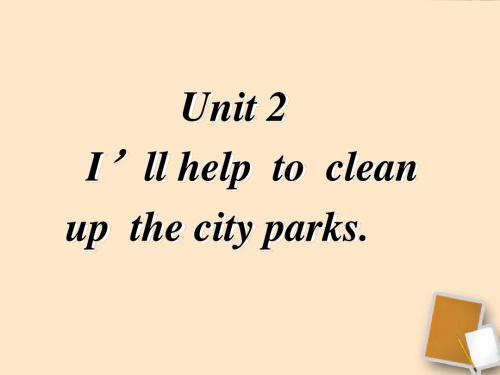
call up 5. We could each _______ _______ ten people and ask them to come.
• e up with 提出、想出 • V+up with end up with • Keep up with • Catch up with Tom quickly come up with the answer to the question.
• 1.help out 帮助、帮助...出来 • Help sb out • He gave away a lot of money to the people to the people in the earthquake area to help them out.
• • • •
ed to 过去、曾经.. used to do sth 过去常常做某事 be used to doing sth 习惯于做某事 He used to drive a car, but now he is used to walking there to lose weight.
You could help the old people clean up their houses.
You could help the passengers with their luggage.
You could help the passengers with their luggage.
2d.Role-play the conversation.
• Helen: hi,Tom .I am making some plans to work in an old people’s home this summer. • Tom: Really? I did that last summer. • Helen: oh,what did they ask you to help out with? • Tom: Mm...things like reading the newspaper to the old people,or just talking to them .they told me stories about the past and how things used to be.
Unit 8 I’ll help clean up the city parks

Learning without thought means labor lost Thought without learning is perilousUnit 8 I’ll help clean up the city parks 九年级英语第八单元教学设计作者:高玉玲学校:乌市92中学Hope is lifeUnit 8 I’ll help clean up the city parks九年级英语第八单元Unit8 I’ll help clan up the city park教学设计课题Unit8 I’ll help clan up the city park班级Class Five地点多媒体教室课时第三课时教师Gao yuling教材分析Analysis of the teaching material本单元以Volunteering 为话题设计了四个部分的内容。
Section B 部分有四个模块:第一模块是词汇的学习(1a)与运用(1b);第二个模块以听力训练形式强化第一模块中所学词汇(2a, 2b)和口语训练(2c);第三个模块围绕中心展开阅读(3a) a volunteer’s work 并再次强化了第一模块中的词汇学习(3b);第四模块仍就the work the volunteers do 这一话题以小组活动形式进行口语训练(4).Self check 该部分有两个模块:第一模块对所学词汇进行填空训练(1);第二个模块以某一志愿者的活动为内容进行写作和口语练习(2)。
通过对动词短语和目标句型的学习,提高学生语言交际能力; 通过对文段篇章的学习, 培养学生为他人着想,热爱公益事业,乐于助人的优秀品质. 共计五个课时.今天是第三课时,主要内容是阅读和写作,还有与此有关的任务性活动.学情分析Analysis of the students1.经过二年的新课程理念的熏陶及实践,学生有了初步的自主、合作、探究、实验的能力.但学生对知识点的掌握仍存在差异,因此对于基础差的学生,多鼓励他们说,把指令给他们说的再细一些。
九年级英语上册《Unit 8 I’ll help clean up the city parks-Section A 笔记》课件

10. volunteer in an after-school study program 10. 在课外学习班做义工
11. We need to come up with a plan. 11. 我们需要想出一个计划。
20. set up a food bank
20. establish a food bank 20. 创建一个食品库
21. Being a volunteer is great. 21. 做个志愿者真棒!
22. The earth is home to mankind. 22. 地球是人类的家园。
5. I'd like to help homeless children. 5. 我想帮助无家可归的人。
6. give out food at the food bank 6. 在救济食品发放中心分发食物
7. cheer up sick kids 7. 使生病的孩子高兴起来
8. help stop hunger 8. 伸出援手消除饥饿
29. He wants to b. 他想成为一个专业歌手。
30. Not only do I feel good about helping other people,
but I get to spend time doing what I love to do. 30. 帮助别人,不但我自己快乐,而且我开始花时间做 我喜欢做的事了。
23. volunteer one's time to help others 23. 自愿付出时间去帮助他人
24. a major commitment 24. 重大的奉献
九年级英语-Unit_8_I'll_help_clean_up_the_city_parksAlHHwA
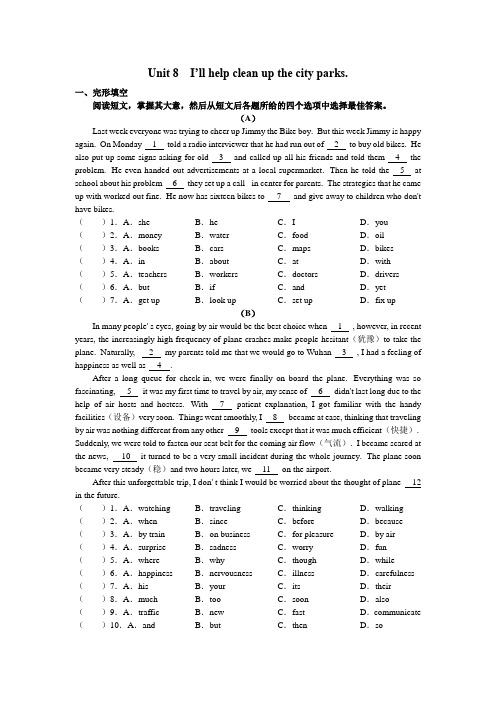
Unit 8 I’ll help clean up the city parks.一、完形填空阅读短文,掌握其大意,然后从短文后各题所给的四个选项中选择最佳答案。
(A)Last week everyone was trying to cheer up Jimmy the Bike boy. But this week Jimmy is happy again. On Monday 1 told a radio interviewer that he had run out of 2 to buy old bikes. He also put up some signs asking for old 3 and called up all his friends and told them 4 the problem. He even handed out advertisements at a local supermarket. Then he told the 5 at school about his problem 6 they set up a call - in center for parents. The strategies that he came up with worked out fine. He now has sixteen bikes to 7 and give away to children who don't have bikes.()1.A.she B.he C.I D.you()2.A.money B.water C.food D.oil()3.A.books B.cars C.maps D.bikes()4.A.in B.about C.at D.with()5.A.teachers B.workers C.doctors D.drivers()6.A.but B.if C.and D.yet()7.A.get up B.look up C.set up D.fix up(B)In many people' s eyes, going by air would be the best choice when 1 , however, in recent years, the increasingly high frequency of plane crashes make people hesitant(犹豫)to take the plane. Naturally, 2 my parents told me that we would go to Wuhan 3 , I had a feeling of happiness as well as 4 .After a long queue for check-in, we were finally on board the plane.Everything was so fascinating, 5 it was my first time to travel by air, my sense of 6 didn't last long due to the help of air hosts and hostess.With 7 patient explanation, I got familiar with the handy facilities(设备)very soon. Things went smoothly, I 8 became at ease, thinking that traveling by air was nothing different from any other 9 tools except that it was much efficient(快捷). Suddenly, we were told to fasten our seat belt for the coming air flow(气流). I became scared at the news, 10 it turned to be a very small incident during the whole journey. The plane soon became very steady(稳)and two hours later, we 11 on the airport.After this unforgettable trip, I don' t think I would be worried about the thought of plane 12 in the future.()1.A.watching B.traveling C.thinking D.walking ()2.A.when B.since C.before D.because ()3.A.by train B.on business C.for pleasure D.by air()4.A.surprise B.sadness C.worry D.fun()5.A.where B.why C.though D.while()6.A.happiness B.nervousness C.illness D.carefulness ()7.A.his B.your C.its D.their()8.A.much B.too C.soon D.also()9.A.traffic B.new C.fast D.communicate ()10.A.and B.but C.then D.so()11.A.took B.landed C.flew D.jumped()12.A.accident B.time C.story D.speed二、阅读理解(A)()1.You can read ________ to find the new movies.A.P. 28 B.P. 12 C.P. 15 D.P. 26()2.From P. 16 you can get something on________.A.news B.sports C.people D.weather ()3.Where can you read the index?A.On TV. B.In a magazine.C.In a theater.D.In a restaurant.(B)Jane' s school day starts at eight - thirty. It begins with a group discussion of the Children' s News - round of the night before. After that, the children usually have a math or an English lesson. At ten -thirty there is a fifteen -minute break. Then the children play outside. After the break they have geography, history, or biology. In most Canadian schools the children are divided into groups that stay together all day. Each group has its own teacher, who teaches almost every subject.At twelve- fifteen the children eat their sandwiches at home or school. After that, they play all kinds of games, like marbles, skipping, ball, and tag.Jane' s school day goes on, and she starts up at one o' clock. In the afternoon, the children study French or math, or they have a music class, physical education, or swimming lessons. Sometimes they put on plays. There are two computers in the classroom. The children take turns using them. Today it is Jane' s turn to use the computer and she will work on math.School finishes at half past three. Jane goes home by bike directly.()1.Children have math after________.A.discussion B.break C.breakfast D.lunch()2.When do children have geography?A.At 8: 30.B.At 12: 15.C.In the afternoon.D.After the break.()3.After lunch, children________.A.have swimming lessons B.play all kinds of gamesC.have physical education D.play computer games()4.Children take turns ________ in the classroom.A.having lunch B.using computersC.putting on a play D.taking a break()5.We can learn from the text that children ________.A.have little chance of playing games B.study only one subjectC.learn, play and have fun at school D.all go home by bus(C)One night Matt saw his grandmother was holding a flashlight. “Are you searching for something, Grandma?” he asked. “I'm going to search for sea turtle nests(巢穴). Come with me,” replied his grandma.Matt's teacher had said there were few sea turtles left in the world, so people were helping to save them. Matt could hardly wait to search for sea turtle nests.On the way to the beach, Matt carried some wooden sticks(小棍)and a roll of wide yellow tape. While walking, Grandma described how mother sea turtles scoop a hole in the sand. Then they lay their eggs and finally cover them up with sand. In this way the sea turtle mothers make sure their eggs stay warm and safe until they hatch(孵化).“Why do you want to find the nests?” Matt asked.“We mark the nests with yellow tape to make people notice where the nests are. Without the tape to signal where the nests are, people might walk or drive on them and pack down the sand. This could hurt the eggs or cause the baby sea turtles not to be able to dig their way out after they hatch.”“After they hatch, the baby go out to the sea, following the light that shines off the ocean,”Grandma said.“People who live along the beach turn off outside lights at night during the hatching season. They want to help make sure the baby turtles go toward the light shining on the ocean.”At the beach Matt and his grandmother began searching for signs of sea turtles. Soon Matt found a wavy path near the water. Together Matt and Grandma marked the nest. They hammered tall sticks into the sand and tied the yellow tape around them.Two months later, Matt was anxious to check on the nest that he had helped mark. So that night he and his grandmother walked down to the beach under a beautiful full moon. The moonlight formed a silvery pathway from the shore out to sea. As Matt and his grandmother got to the nest, the sand began to move. From under the sand baby sea turtles came out, fighting their way to the surface(表面). As they struggled toward the water, a gentle wave picked them up and took them out to their new home.1.When Grandma asked him to search for sea turtle nests, Matt was________.A.bothered because he had to waitB.proud of his grandmother' s behaviorC.excited for he could help the creaturesD.nervous for he was not sure what to do2.Sea turtle nests were marked with the yellow tape so that________.A.visitors could easily find the turtle eggsB.the eggs would not be hurt by accidentC.the mother sea turtle could find her kidsD.Matt and his grandmother could find them3.In which order did things happen?a.The wave picked up the sea turtles to the sea.b.Sea turtles scooped a hole in the sand.c.People living along the beach turned off the lights.d.Sea turtles covered their eggs to keep them safe.e.People marked the nest with the yellow tape.A.b, a, d, e, c B.d, b, c, a, eC.b, d, e, c, a D.d, a, c, e, d4.The main idea of the text is that Matt and his grandmother________.A.helped the sea turtles hatch the eggs in the sand at nightB.saved the sea turtles and helped them find their way homeC.spent some meaningful time with the sea turtles on the beachD.took care of the sea turtle eggs and watched the babies go home三、写作训练(A)9班的同学很愿意当志愿者,他们根据自己的特长帮助别人做一些力所能及的事。
人教版九年级英语同步作文_unit8
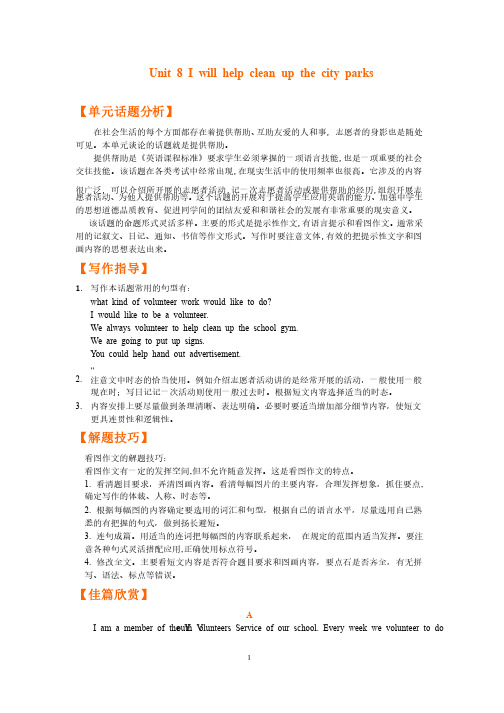
Unit 8 I will help clean up the city parks【单元话题分析】 在社会生活的每个方面都存在着提供帮助、互助友爱的人和事互助友爱的人和事, , , 志愿者的身影也是随处志愿者的身影也是随处可见。
本单元谈论的话题就是提供帮助。
可见。
本单元谈论的话题就是提供帮助。
提供帮助是《英语课程标准》要求学生必须掌握的一项语言技能提供帮助是《英语课程标准》要求学生必须掌握的一项语言技能,,也是一项重要的社会交往技能。
该话题在各类考试中经常出现交往技能。
该话题在各类考试中经常出现,,在现实生活中的使用频率也很高。
它涉及的内容很广泛很广泛, , , 可以介绍所开展的志愿者活动可以介绍所开展的志愿者活动可以介绍所开展的志愿者活动,,记一次志愿者活动或提供帮助的经历记一次志愿者活动或提供帮助的经历,,组织开展志愿者活动、愿者活动、为他人提供帮助等。
为他人提供帮助等。
为他人提供帮助等。
这个话题的开展对于提高学生应用英语的能力、这个话题的开展对于提高学生应用英语的能力、这个话题的开展对于提高学生应用英语的能力、加强中学生加强中学生的思想道德品质教育、促进同学间的团结友爱和和谐社会的发展有非常重要的现实意义。
的思想道德品质教育、促进同学间的团结友爱和和谐社会的发展有非常重要的现实意义。
该话题的命题形式灵活多样。
主要的形式是提示性作文主要的形式是提示性作文,,有语言提示和看图作文。
通常采用的记叙文、日记、通知、书信等作文形式。
写作时要注意文体用的记叙文、日记、通知、书信等作文形式。
写作时要注意文体,,有效的把提示性文字和图画内容的思想表达出来。
画内容的思想表达出来。
【写作指导】1.1. 写作本话题常用的句型有:写作本话题常用的句型有:what kind of volunteer work would like to do? I would like to be a volunteer. We always volunteer to help clean up the school gym. We are going to put up signs. Y ou could help hand out advertisement. …2. 注意文中时态的恰当使用。
Unit8 I’ll help clean up the city parks grammar
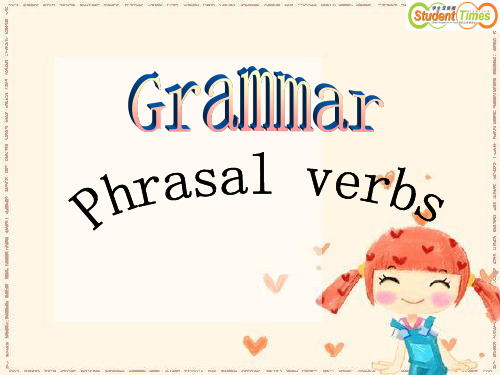
记下,放下 放出,伸出
2. 由give引导的短语。 • give up Vt. +副词 Vi. +介词 • give in Vt. +副词 • give out • give away Vt. +副词 • give back Vt. +副词 • give off Vt. +介词
5.由look 引导的短语。 look after Vi. +介词 look for Vi. +介词 Vi. +介词 look at look into Vi. +介词 look through Vi. +介词 Vi. +介词 look out look out of Vi. +介词 look up Vi. +副词 Vi. +介词 look like
6.由show引导的短语。 turn up Vt.+ 副词 turn on Vt.+ 副词 Vt.+ 副词 turn off Vt.+ 副词 turn down turn to Vt.+ 介词 turn over Vt.+ 副词 turn in Vt.+ 介词 turn out Vt.+ 介词
把(音量)开大; 出现,到达 打开
照顾,照料
寻找,找… 看… 调查;向…里看 浏览,快速的看 小心 向…外看 查找,查询; 向…上看 看起来像…
5.由show引导的短语。
Vt. + 介词 • show up Vt. + 介词 • show off • show around Vt. + 副词
出现;露面 炫耀;卖弄 带…参观…
2013-2014新目标九年级英语Unit_8_I’ll_help_clean_up_the_city_parks.Section_B课件
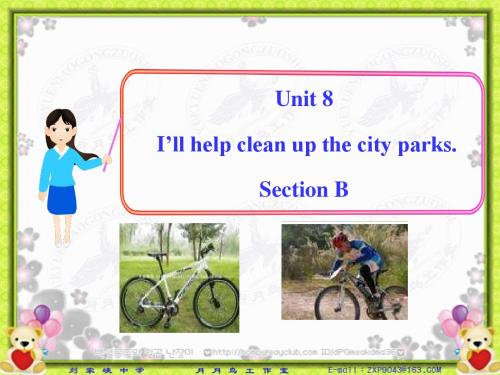
Revision
Phrasal verb(短语动词 )
1.定义: 动词之后加介词或副词构成短语动词,表达一种 特定的含义;如果被拆开则不能表达这种特定的含义. 2.分类: 及物短语动词必须接宾语,不及物短语动词则不 需接宾语.
Monday he told a radio interviewer that he had run out of
money to buy old bikes. He also put up some signs asking for old bikes and called up all his friends and told them about the problem.
3. 及物短语动词所接宾语的位置: (1)名词作宾语时,对于”动词+副词”的短语,名词既可 以放在短语动词之后,也可以放在短语动词中间. 对于” 动词 + 介词” 的短语, 名词放在介词之后. (2) 代词作宾语时,对于”动词+副词” 的短语,代词放在 短语动词的中间,对于”动词+ 介词” 的短语,代词放 在介词之后.
推迟,延后
分发
put up
张贴
Presentation
1a Match the sentences with similar meanings. b 1. I’ve run out of it. c 2. I take after my mother. a 3. I fixed it up. d 4. I gave it away.
Homework
Write a passage about the volunteer work
九年级英语Unit 8 I’ll help clean up the city parks.教学设计(4课时)

2013-2014第一学期初中英语电子备课主题单元教学设计表单元标题Unit 8 I’ll help clean up the city parks.学校年级9年级主备教师复备教师备课项目分值设计区域备课标与教材单元5分课标与教材(单元)的联系:本单元通过谈论志愿者活动来理解、掌握、运用常见的动词短语,能够运用常见的动词短语进行对话练习,向他人提供帮助;能够运用动词短语描述志愿者活动的措施。
在初中英语新课标中占有重要地位。
1、听:能听懂并提取有关“Ways of helping people””Plans about theClean-Up Day”“The Bike Boy”等的信息,并能简单标记相关信息;并能针对所听语段的内容记录所需词汇和句型,完成相关的句型补充。
2、说:能够询问、提供、讨论有关“Ways of helping people””Plansabout the Clean-Up Day”“The Bike Boy”等的信息,并能向他人的志愿者活动提出相关的建议。
3、读: 能够运用skimming/ scanning/ careful reading等阅读策略,从Section A 3a中获取有关volunteer work的相关信息;能够从SectionB 3a中获取the Bike Boy’s strategies的相关信息;能够从Reading中获取有关Animal Helpers/ Liz Smith/ Lucky的相关信息。
能正确、连贯、流畅地朗读课文。
4、写:能写出“My volunteer plans”“A reply to Liz Smith”的短文。
5、理解和领悟本单元词汇的基本含义,并使用这些词汇描述volunteerwork/ volunteer plans; 理解、掌握、运用常见的动词短语,注意动词短语的辨析以及时态的正确运用。
5分本单元的重点1、听:能听懂并提取有关“Ways of helping people””Plans about theClean-Up Day”“The Bike Boy”等的信息,并能简单标记相关信息;并能针对所听语段的内容记录所需词汇和句型,完成相关的句型补充。
教案10Unit 8 I’ll help clean up the city parks

Ask a student to read the sample sentence in the book. Tell them to write out the things that Jimmy did. Use the sample sentence as a model. And they can reread the article to search for the answers. Let the students complete the work on their own.
Answers
cheer up, run out, put up, called up, handed out, set up, come up with, fix up, give away.
Then have them work in pairs. Tell them to check each other’s answers carefully and point out the mistakes their partners may have made. Tell them to help each other like this as often as possible.
StepⅡ3a
This activity provides reading and writing practice using the target language.
We have learned something about Jimmy.
- 1、下载文档前请自行甄别文档内容的完整性,平台不提供额外的编辑、内容补充、找答案等附加服务。
- 2、"仅部分预览"的文档,不可在线预览部分如存在完整性等问题,可反馈申请退款(可完整预览的文档不适用该条件!)。
- 3、如文档侵犯您的权益,请联系客服反馈,我们会尽快为您处理(人工客服工作时间:9:00-18:30)。
10. The good news of our football team winning the game ______ everybody there
A. cheered outB. cheered upC. cheered onD. cheered for
学习难点:
1) Would like to dosth.= would love to dosth.
I’d like to go somewhere relaxing = I’d love to go somewhere relaxing.
2) will do sth.
预习准备:
翻译短语:
分发在某方面帮助某人想出
A. put downB. put onC. puted hima hospital at the side of the street.
A. set aboutB. set outC. set upD. set with
3. The people in this village have to walk a mile towater.
学习重点:
掌握词汇及短语
volunteer, work outside, cheer up, help sb with sth, give out, clean up, in the hospital, come up with, put off, write down, hand out, call up.
A. for; asB. to withC. after; toD. away; from
6. --Would you help me______, Mr Lin? This question’s too hard for me
--OK. Let me try.
A. afterB. outC. upD. with
7. --What do you think of the book?
--I like it very much. It’s ______ interesting ______exciting.
A. neither; norB. not; but
C. not only; but alsoD. either; or
11. The teacher came into the room, with a bottle ______water in his hand.
A. filledB. filled withC. fullD. full with
12. Don’t_____ the radio. The baby is sleeping.
14. --Thank you for helping me.
--________.
A. That’s rightB. My pleasureC. No, no thanksD. It doesn’t matter
15. You ate not allowed to______ advertisements on this wall without special permission.
A. turn offB. turn onC. turn overD. turn down
13. The Spring Festival is coming, I’ll______ up my room . I don’t want to live in a dirty room.
A. lookB. cleanC. setD. turn
A. elementary B. takeC. fetchD. have
4. The blind and the deaf belong topeople.
A. elementary B. takeC. unableD. major
5. --Jim takes______ his father
--Jim takes_____ his father.
8. I_____ half an hour reading English in the morning. And it helps me lot.
A. put onB. spendC. put offD. pay
9. Let’s_____ planting the trees until tomorrow. I think it’s going to rain.
推迟写下在医院打扫
学习过程
环节
学案
备注栏
情境导入
展示几张需要帮助的人或事的图片
(如:sick people, homeless children, dirty park, hunger)
问题探究
What can you do to help sick people? I could visit them in the hospital. I’d like to buy them some flowers. I hope to cheer them up.
克令乡中心学校导学案
课题:
Unit 8 I will help clean up the city parks.
时间
11.21
年级
九(3)班
主备人
袁羚
审核人
学习目标:
能运用以下句型进行交际。
I’d like to work outside. You could give out food at a food bank.
展示交流
2.教学1b,2a, 2b
首先,帮助学生明确本题的要求。接着,听力练习,学生根据录音内容完成1b,2aand 2b。最后,重放一遍录音内容,学生跟读。
检
测
反
馈
1. These new books mustbefore the teacher comes to the classroom.
A. be given outB. be gave out C. are given awayD. give out
